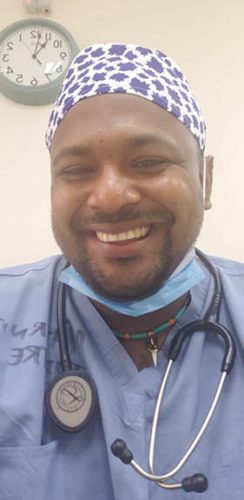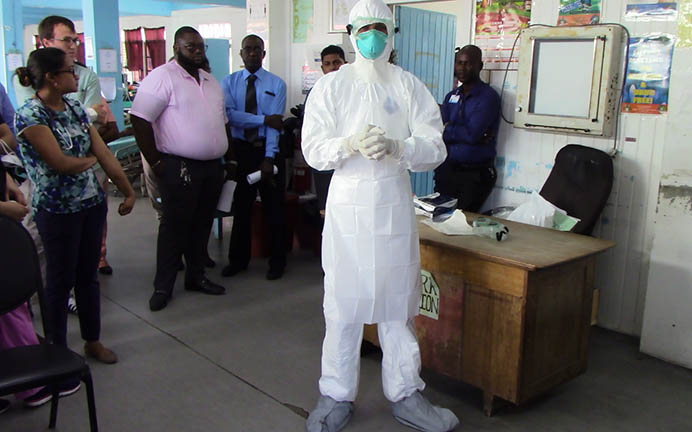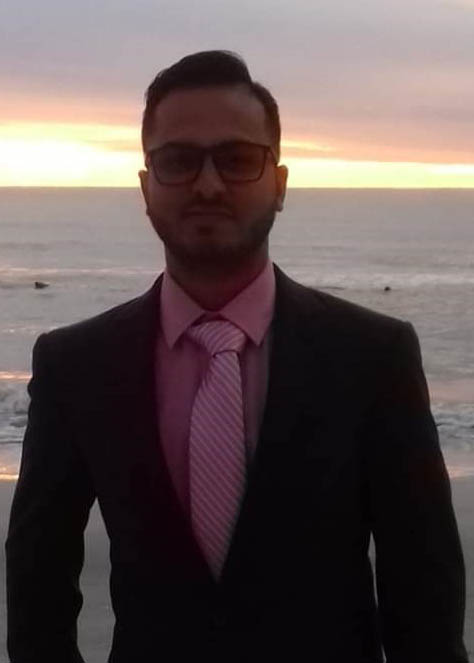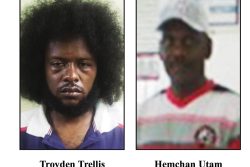Baldeo Singh and Anish Bhagwandeen are soldiers and they are actively involved in fighting a war for Guyana. Every day they put on their uniforms, not the Guyana Defence Force’s, but Personal Protective Equipment (PPE) and they move to the battlefield at the Georgetown Public Hospital (GPH).
They are doctors and they work with Covid-19 patients at the GPH.
Dr Singh is in internal medicine and works in the Intensive Care Unit (ICU), which means he is one of the first responder doctors who sees patients at the hospital gate if the need arises.
Dr Bhagwandeen works strictly with ICU patients. They both work 12-hour shifts.

They have both been working at the GPH since they graduated in 2013 and in 2015 Dr Singh began internal medicine and graduated as a specialist in internal medicine and infectious diseases.
Both doctors volunteered to work in the Covid-19 department as they were part of the team involved in caring for a group of Chinese doctors who were isolated for a period last year.
It was a brave decision as worldwide, a number of doctors who cared for Covid-19 patients died.
Drs Singh and Bhagwandeen do not live with their relatives so they took this into consideration when volunteering to treat Covid-19 patients. Many doctors, for good reason, may have hesitated to do so and would have seen some resistance from family members if they made such a decision.
Dr Singh’s father lives on the island of Leguan and Dr Singh has asked him to remain there, even though like any parent he must be worried for his son. His mother lives in the US, where Dr Singh’s sister is a nurse and also works with Covid-19 patients. “They are worried…,” he said of his parents. Dr Singh’s fiancée is also a doctor who works in the unit with Covid-19 patients.
Dr Bhagwandeen’s family members are also worried, and they encourage him to take the necessary precautions and for him it feels better living alone so as to minimize any exposure to his relatives.

Giving an insight as to what happens in isolation, Dr Singh shared that patients are confined to their beds all day and all night unless they have to use the bathroom and if they are very sick then staff have to do everything for them.
Dr Bhagwandeen said the patients don’t even know when the hours are passing and may not even know what day of the week it is. “They don’t even realise that it is 24 hours already or five hours…,” he said.
Patients sometimes want to know who is under the PPE and Dr Singh said the doctors are considering pasting their names and photographs onto the suits to present a face for the patients they interact with.
In the ICU, Dr Bhagwandeen explained, they visit with the patients every four hours and they change the ventilating settings if the need arises to ensure that the patient continues to breathe.
“The disease is terrible and then the impact it has on families is terrible,” Dr Singh said sadly while he added that it could be prevented if persons just stay home.
And he hopes that persons are not scared to visit the hospital if they believe they have contracted the disease because they are scared of being isolated. He encouraged persons to visit the hospital if they are getting symptoms.
“Because you don’t know how severe the disease could be because you could be okay one day and then the next day you are having shortness of breath, difficulty breathing, and you can go. It is a very rapid disease, the progression of it is very fast. So, if you having symptoms, please come, get evaluated and if you fit the criteria, get tested and then we decide…,” Dr Singh said.
Apart from seeing the patients in the isolation, Dr Singh also heads his team that makes the decision if the patient will be admitted to be tested.
Explaining what happens when a patient turns up at the hospital, Dr Singh said they will come through the New Market Street entrance, then be sent to the East Street triage area, where they would be evaluated. If the doctors there suspect that it might be a case, they call internal medicine and ask for advice and if the patient is stable it would be advised that they home isolate and they are tested the next day or the same day. If the patient is sick, they are placed in what is called the ‘tent hospital’, set up in the GPH’s compound, and they are treated until the results are returned. Once the result is returned, if the patient is still not stable, they are transferred to the isolation unit but if stable with a positive result then they are transferred either to the Diamond Hospital or the West Demerara Hospital.
“That is basically how it goes on a daily basis,” the doctor said, adding that there are about 60 to 80 persons a day who visit with symptoms.
First responder
Dr Singh was one of the first responders to the second suspected patient of the virus, which turned out to be a false alarm as while the patient showed some symptoms the result came back negative.
“I didn’t feel scared. But I know there were risks associated with it… I knew that we had the right equipment to deal with it so it… I just knew that whatever clinical picture the patient presented we will have to treat it to our best, taking in mind we don’t have an x-ray unit so we have to use a lot of clinical skills,” Dr Singh said of first instance he was called out.
The first supposed case was “a bit easy” because the patient had already been treated at the emergency unit. That first patient was very afraid, as would be expected, and this is where Dr Singh had to put on his counselling hat and keep reassuring her that everything would work out fine. “We let her know that she was in good hands and that we are doing our best and not to worry because there is always a doctor or a nurse or both doctors and nurses all the time there…”
Since then they have been “slowly putting things into place”, he said, and it has become easier to work and deal with the patients. He revealed that when the first few patients were diagnosed to be positive some difficulties were created as they did not expect it to happen so quickly but with time “everything got into place. Still not 100% perfect how we want it, but it’s getting there.”
Dr Singh said the questions from persons he knows are many as they want to know more about the disease and he tries as best as he knows to make it as “simple as possible,” informing them what it is, what they should expect and importantly what they should do.
“Everybody responds differently. Some people are panicking…but some people are taking everything in that we tell them, taking all the precautions and so,” he said.
Quite different
Dr Bhagwandeen is the chairman of the Infection Prevention Control (IPC) body of the GPH and he said it was nothing new for him to work in the Covid-19 ICU as he worked with the isolated Chinese patients and was involved in their ventilation management.
He explained that the ICU team co-manages the treatment of the patients with the internal medicine team.
Up to the time of writing six persons had died as a result of the disease and Dr Bhagwandeen said the last patient who died for him was miner Derrick Jaisingh.
As a doctor he had patients who passed away but with the Covid-19 patients, the doctor said, their deaths are quite different.
“Most of the patients who usually die there [in the hospital’s normal ICU] they are intubated, they have been there for a very long time…but for this [Covid-19] it is something new and you didn’t expect them to die so fast… We review them before just to assess their respiratory systems to see how they are doing and you plan to intubate them but when you actually see these patients…it is really sad…,” the doctor shared.
Speaking to the public, Dr Bhagwandeen advised that persons stay home and only leave when it is absolutely necessary.
He is very concerned that persons are not taking the pandemic serious as persons are still out on the road liming and consuming alcohol.
“It worries me as to why they are not taking this thing seriously because we are there, and we know the patients and see how they react [and] it is really sad. So, I would advise them to stay home, if you need to go and get something just go and get and just avoid contact with a lot of people,” he further advised.
Dr Singh shared the same concerns and in an attempt to get the public to understand not just the severity of the disease but also the isolation which in itself can be heartrending, he pointed out that many of the patients do not get to see their relatives.
“You could only think what the family is going through, and I am sure no one wants their families to go through that especially if they have kids, they have parents who are depending on them. So, the only thing is for you to stay home. I know there are other financial and social sides attached to it but right now life matters more than anything else so staying home is the best thing,” he warned.
He reminded if persons are going out they should practice social distancing, wash their hands, sanitise and use their masks as he indicated that he does not believe society understands the importance of these practices and what it means if they get sick and have to be isolated or in the worst case scenario, have to be placed in the ICU.
Visiting hospitals
Talking about his journey to becoming a doctor, Dr Bhagwandeen said it stemmed from him visiting numerous hospitalized persons as a child. He grew up in Essequibo and he said persons were “in and out of hospital” and he was always there “taking clothes and other stuff” and him being at the hospital saw him interacting with doctors and nurses and that is where it all started.
On the other hand, Dr Singh said it was always his passion to help persons and being a doctor provides the perfect opportunity. His parents had pushed being a lawyer or a doctor to becoming a better person and he chose the latter.









